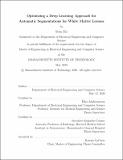Optimizing a deep learning approach for automatic segmentations for white matter lesions
Author(s)
Ko, Sean,M. Eng.Massachusetts Institute of Technology.
Download1192561553-MIT.pdf (5.737Mb)
Other Contributors
Massachusetts Institute of Technology. Department of Electrical Engineering and Computer Science.
Advisor
Elfar Adalsteinsson and Jayashree Kalpathy-Cramer.
Terms of use
Metadata
Show full item recordAbstract
White matter lesion detection in the brain is crucial in diagnosing cerebral adrenoleukodystrophy early in order for life-saving therapies to be as effective as possible. To assist doctors in this early diagnosis, I developed an end-to-end deep learning pipeline to automatically segment these brain lesions in MRI scans. These segmentations will be able to help automatically compute lesion volume and risk scores to help recommend best course of treatment. This pipeline will be optimized by tuning different preprocessing and training parameters to this task. The former half of the pipeline is comprised of all the preprocessing steps performed on the raw data to prepare it as model inputs and reduce training hindrances in the images themselves. These include data conversion, RAI orientation, isotropic resampling, N4 bias correction, coregistration, skull stripping, and normalization. The latter portion of the pipeline focuses on optimizing the training of a 3D UNet by tuning different training parameters, such as patch size, loss function, normalization layers, transfer learning, and additional input channels. The scope of the findings presented here is not limited to this specific task and may be extended to other segmentation tasks as well.
Description
Thesis: M. Eng., Massachusetts Institute of Technology, Department of Electrical Engineering and Computer Science, May, 2020 Cataloged from the official PDF of thesis. Includes bibliographical references (pages 63-73).
Date issued
2020Department
Massachusetts Institute of Technology. Department of Electrical Engineering and Computer SciencePublisher
Massachusetts Institute of Technology
Keywords
Electrical Engineering and Computer Science.